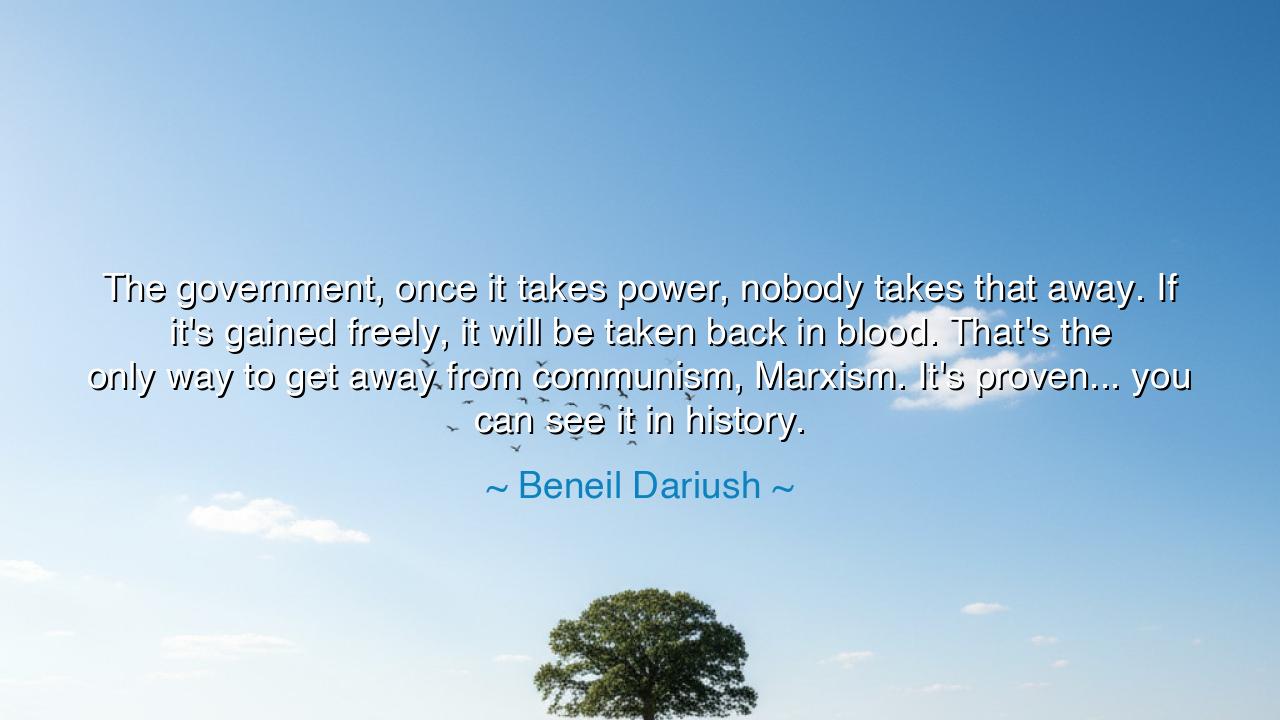
The government, once it takes power, nobody takes that away. If
The government, once it takes power, nobody takes that away. If it's gained freely, it will be taken back in blood. That's the only way to get away from communism, Marxism. It's proven... you can see it in history.






The words of Beneil Dariush, though spoken by a fighter, ring with the gravity of a historian, a philosopher, and a prophet: “The government, once it takes power, nobody takes that away. If it's gained freely, it will be taken back in blood. That's the only way to get away from communism, Marxism. It's proven... you can see it in history.” Beneath these words lies a truth as ancient as tyranny itself—that power, once seized, clings to itself with a grip stronger than iron, and that the freedom surrendered easily is seldom returned without sacrifice. Dariush, born in Iran and raised under the shadow of revolution and authoritarian rule, speaks not from theory but from the deep well of experience. His warning is not political rhetoric—it is a cry from the soul of one who has seen liberty die and knows the cost of its resurrection.
At the heart of this quote is the eternal struggle between freedom and control, between the will of the people and the hunger of rulers. Dariush declares that government, once it crosses the threshold from servant to master, becomes a force that will not relinquish its dominion willingly. When power is taken “freely”—that is, when people yield their rights through apathy, fear, or false promises—they do not realize the depth of their surrender until the chains are already forged. And history, he reminds us, bears witness: no tyranny has ever dissolved through kindness, no despot has ever stepped down from compassion alone. The price of reclaiming freedom, when once it is lost, is always paid in blood.
The origin of this insight comes from Dariush’s own life and from the world’s painful history. Born in 1989, in the wake of Iran’s Islamic Revolution, he grew up hearing of a nation that had once traded one form of oppression for another. The revolution had promised justice, equality, and moral governance—but it delivered censorship, religious authoritarianism, and fear. Dariush’s family fled that world to find freedom in the West, and through his life as an athlete, he learned the discipline of self-control—a principle opposite to tyranny. When he speaks of governments that cling to power, he speaks as one who remembers the cries of his homeland, and as one who has seen how ideology, once weaponized, consumes both rulers and the ruled.
History proves his warning time and again. When the Bolsheviks seized power in Russia, they spoke of liberation for the workers. Yet, within years, the dream of equality became the nightmare of oppression. The Soviet state, built on promises of communal good, devoured its own children in purges, gulags, and famine. Those who had “freely” embraced the revolution found themselves enslaved by it, their voices silenced, their faith punished, their individuality erased. When the people finally broke free, generations later, it was not through petitions or polite debate—it was through the slow bleeding of resistance, the martyrdom of truth against the empire of lies. Dariush’s words echo this pattern: that every ideology that demands blind faith in the collective ends by crushing the individual soul.
The same story unfolded in China’s Cultural Revolution, in Cuba’s revolution under Castro, and in countless nations where citizens traded their freedom for promises of equality or safety. In each, the people believed that surrendering control to a powerful state would bring them peace—and in each, they awoke to find themselves ruled by fear. And when freedom returned, it was only through revolt, sacrifice, and struggle. Power, once given, is never returned unasked—it must be taken back by courage. Dariush’s words remind us that this law is not of politics alone, but of human nature: the appetite for control, once fed, grows insatiable.
But his statement also contains a call to wisdom and hope. For though the road to reclaim liberty may be steep and stained with struggle, the greater lesson is that the people must never let it be lost in the first place. A vigilant citizenry, educated in history and unafraid to question authority, can prevent the rise of such oppression. To guard freedom, one must first understand how it dies—not in one great blow, but in a thousand small concessions: the silencing of dissent, the justification of censorship, the acceptance of lies told for “the greater good.” Dariush warns us that once a government discovers that its people will not resist, it ceases to serve and begins to rule.
Therefore, let this quote be carried as a banner of remembrance: freedom surrendered is freedom lost, and power, once entrenched, will yield only to the strength of those who dare to reclaim it. The lesson is clear—resist complacency, cherish liberty, and guard your rights as fiercely as you would guard your life. For history shows that when freedom is lost, it is not parchment or policy that wins it back, but the unbreakable will of the free-hearted.
So let every generation remember Dariush’s warning—not as cynicism, but as sacred truth: that governments are built to serve, not to rule, and that the moment men forget this, tyranny begins its quiet march. Watch the signs. Speak when silence is easier. Stand when others kneel. For in the end, it is not the might of rulers that sustains tyranny—it is the surrender of the governed. And once that surrender begins, only courage and sacrifice can restore what was freely lost.






AAdministratorAdministrator
Welcome, honored guests. Please leave a comment, we will respond soon